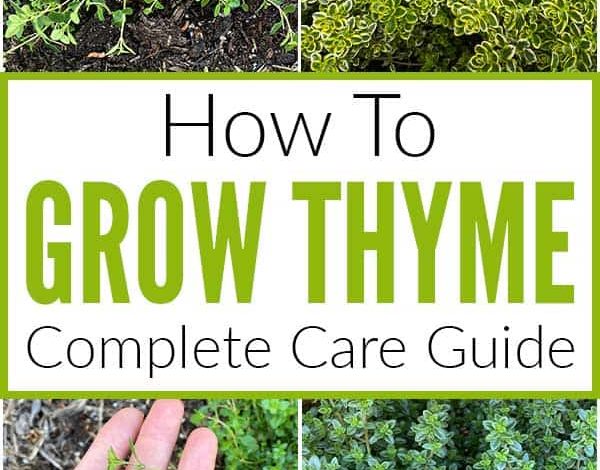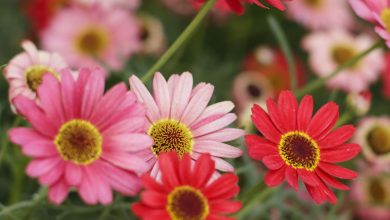How to Grow Thyme Step by Step: Complete Guide

Hello to all agrohuerters! In today’s article the protagonist will be one of the best-known aromatic plants: thyme. We will learn in a simple way how to grow thyme step by step, following the best ones. In this way we will obtain healthy thyme plants to use them later in oils, soaps or as a condiment.

What is thyme?
Thyme, known in Latin as Thymus, keeps us many curious facts that we will discover throughout the article.
This plant belongs to the Lamiaceae family, specifically to the Thymus genus where we can find more than 300 different species of thyme. Some of the more than 300 species of thyme are considered aromatic plants, where the best known species is Thymus vulgaris.

However, if we have to highlight something about thyme, it is the number of uses and benefits in many fields: medicine, cosmetics or food.
Uses and benefits of thyme
Next, before moving on to the cultivation, we are going to see what the most important uses and benefits of thyme are:
- Thyme, like many other aromatic plants, can be found in cosmetic stores for use in soaps, conditioners or facial cleansers.
- In the world of cooking it is used to aromatize oils or cheeses but it can also be used as a condiment in many dishes.
- In medicine it is used to calm digestive and respiratory problems and has anti-inflammatory and antioxidant effects.
- The association with other plants can be beneficial since thyme keeps away some pests such as cabbage fly, aphids or ants.
- One of the most recent uses is its use as a biocide since it has antimicrobial properties.
- In ancient times, thyme had other different uses. For example, the Egyptians used it in embalming and the Greeks as incense.

How to make a thyme infusion?
To complete and finish this section we will see how to prepare a thyme infusion in 4 very simple steps:
- Put water in a saucepan. The amount of water will depend on the amount desired by each one. Heat to boil.
- When the water is boiling we will add our thyme. Let cook for 10-15 min.
- Finally, we will filter and the infusion by removing the parts of thyme from the water.
- In addition, some type of sweetener or honey can be added to our infusion and it will be ready to consume.
Steps to grow thyme
Once we know this plant thoroughly, we are going to learn how to grow thyme in a very simple way:
1. Preparation of the land or substrate
Thyme is best suited to light, well-drained soils. It prefers sunny sites to shady ones, so it will not be damaged if it is exposed to many hours of sunlight.
Therefore, if you decide to grow thyme in a pot, you should place the pot in a place in the house where it receives sunlight. This way your thyme plant will grow strong and healthy.
One of my favorite thyme plants is the one known as lemon thyme because it always reminds me of my hometown garden. If you don’t know it, I recommend it 100% because of its smell.

If you are interested in knowing more about the types of substrates or about which substrate to choose on each occasion, I recommend the following article: What is the best substrate? Types of substrates for garden plants.
2. Planting
Sowing will be done in spring and autumn, spreading the seeds on the surface and covering them lightly with the substrate. Let’s not forget to always apply a light irrigation after sowing.
3. Proper irrigation to grow thyme
One of the best tips is to avoid puddles or excessively wet surfaces as they can cause the appearance of diseases of fungal origin.
For this reason, it can be said that thyme is a plant that does not need excessive water and withstands drought well.
4. Pruning
Thyme pruning is based on removing withered leaves and flowers to encourage the growth of the rest of the plant. That is, it is pruned when it has already flowered.
5. Harvest
Commercial growers of thyme do not usually harvest the first year but from the second to the sixth year it achieves good yields. After 6 years they destroy the plants to rotate the crop. The thyme harvest depends on the use we want to give it.
If we want to grow thyme for oil, the harvest will be done when 50% of the flowers have bloomed and it will be done once a year. However, if we are interested in plant material, 2 or 3 collection sessions can be carried out starting in spring and ending in autumn.
It is not recommended to cut the plants too much as they will be more exposed to adverse temperatures. Therefore, it is recommended to cut up to a maximum of 15 centimeters from the ground with special and disinfected scissors.
When drying thyme, unlike other plants dried in the sun, it is recommended to use hot air dryers.
6. Pests and diseases
Thyme is usually a fairly resistant plant to attack by pests and diseases due to its rustic character. However, on occasion they may appear.
For example, sometimes we can see our thyme leaves with a slight yellowing. This can be caused by nematodes present in the roots. It can be solved by means of a good disinfection of the floors. Here I leave you an article where we talk about soil disinfection: Solarization of the soil, ecological disinfection.
References
- Morales Valverde, R. Taxonomy of the genera Thymus and Thymbra in the Iberian Peninsula. Monograph of the Royal Botanical Garden. Superior Council of Scientific Investigations.
- Velasco Negueruela, A., Pérez-Alonso, J. Essential oils of Iberian thyme. Contribution to the knowledge of the essential oil of Thymus Lacaitae Pau.
- Royal Thyme, Andalusian Thyme. Board of Andalusia. 2018.
- Thyme. Spanish Nutrition Foundation.
- The country. Thyme, more than just an aromatic plant. 2005.
This is all for today, I hope you liked the article on how to grow thyme step by step and that you are encouraged to incorporate this plant into your orchards and gardens.
Have a nice day

![Photo of Lantana Cuttings: [Grafts, Time, Rooting and Planting]](https://www.complete-gardening.com/wp-content/uploads/2022/08/lantana-cuttings-grafts-time-rooting-and-planting-390x220.jpg)
![Photo of Citrus Miner: [How to Identify and Fight It]](https://www.complete-gardening.com/wp-content/uploads/2022/08/citrus-miner-how-to-identify-and-fight-it-390x220.jpg)

![Photo of Planting a Banana: Complete Guide [Answer to All Your Questions]](https://www.complete-gardening.com/wp-content/uploads/2022/08/planting-a-banana-complete-guide-answer-to-all-your-questions-390x220.jpg)